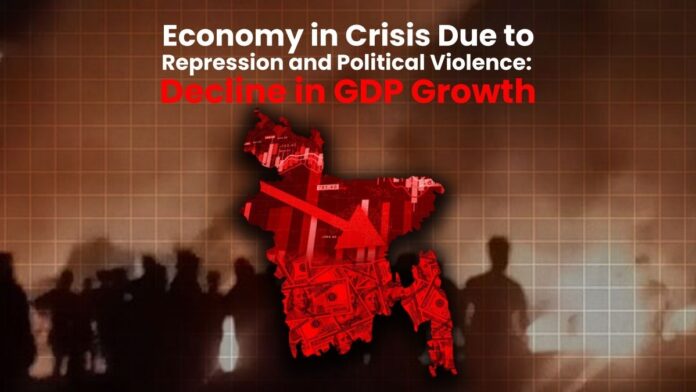Bangladesh’s economy is currently facing a deepening crisis, compounded not only by global challenges but also by internal political instability and ongoing violence. In its latest report, the World Bank has forecasted the country’s GDP growth for the 2024-25 fiscal year to be just 3.3%, which is lower than the projections made by the Asian Development Bank (ADB) and the International Monetary Fund (IMF).
The World Bank report cites political uncertainty and structural weaknesses in the economy as the main reasons behind this decline. Economists believe that political violence and attacks on religious minorities have severely undermined Bangladesh’s investment environment.
Recently, crackdowns on opposition parties, a lack of electoral transparency, and violent political movements have created a climate of uncertainty in the country. According to experts, this violence not only represents human rights violations but is also a major reason for declining investor confidence. Bangladesh’s image has been tarnished both domestically and internationally, causing foreign investors to shy away from launching new projects due to the prevailing uncertainty, which is directly impacting employment and production.
The World Bank’s South Asia Development Update report mentions that Bangladesh’s inflation rate could average around 10% during this period, which would make everyday life even more difficult for ordinary citizens and potentially fuel further social unrest.
This report was published on April 21 in Washington D.C., during the third day of the Spring Meetings of the World Bank and IMF. The meetings will continue until April 26, with Bangladesh being represented by a 15-member delegation led by Economic Advisor Salehuddin Ahmed.
However, the government is still downplaying the impact of political instability. The interim government of Bangladesh has announced a revised GDP growth target of 5.25%, down from the previous target of 6.75%.
Yet, according to experts, the reality is even more dire. Data from the Bangladesh Bureau of Statistics show that GDP growth in the last fiscal year was 4.22%, and in the first quarter (July-September) of the current fiscal year, it has dropped further to 1.96%.
The World Bank has forecasted a slowdown not just for Bangladesh but for the entire South Asian region. However, for Bangladesh specifically, the lack of social resilience and political stability has been identified as the primary reasons behind the sharp decline.
Martin Raiser, Vice President of the World Bank for South Asia, said, “Now is the time to undertake targeted reform initiatives to build economic resilience and restore growth.”
He advised promoting the private sector, modernizing the agricultural sector, and liberalizing trade.
However, many economic analysts believe that unless political vendettas and persecution of religious minorities are stopped, these reforms alone will not yield significant results.
Experts also warn that unless Bangladesh can establish itself as an inclusive, tolerant, and democratic state, the dream of achieving sustained economic growth will remain elusive for a long time.





